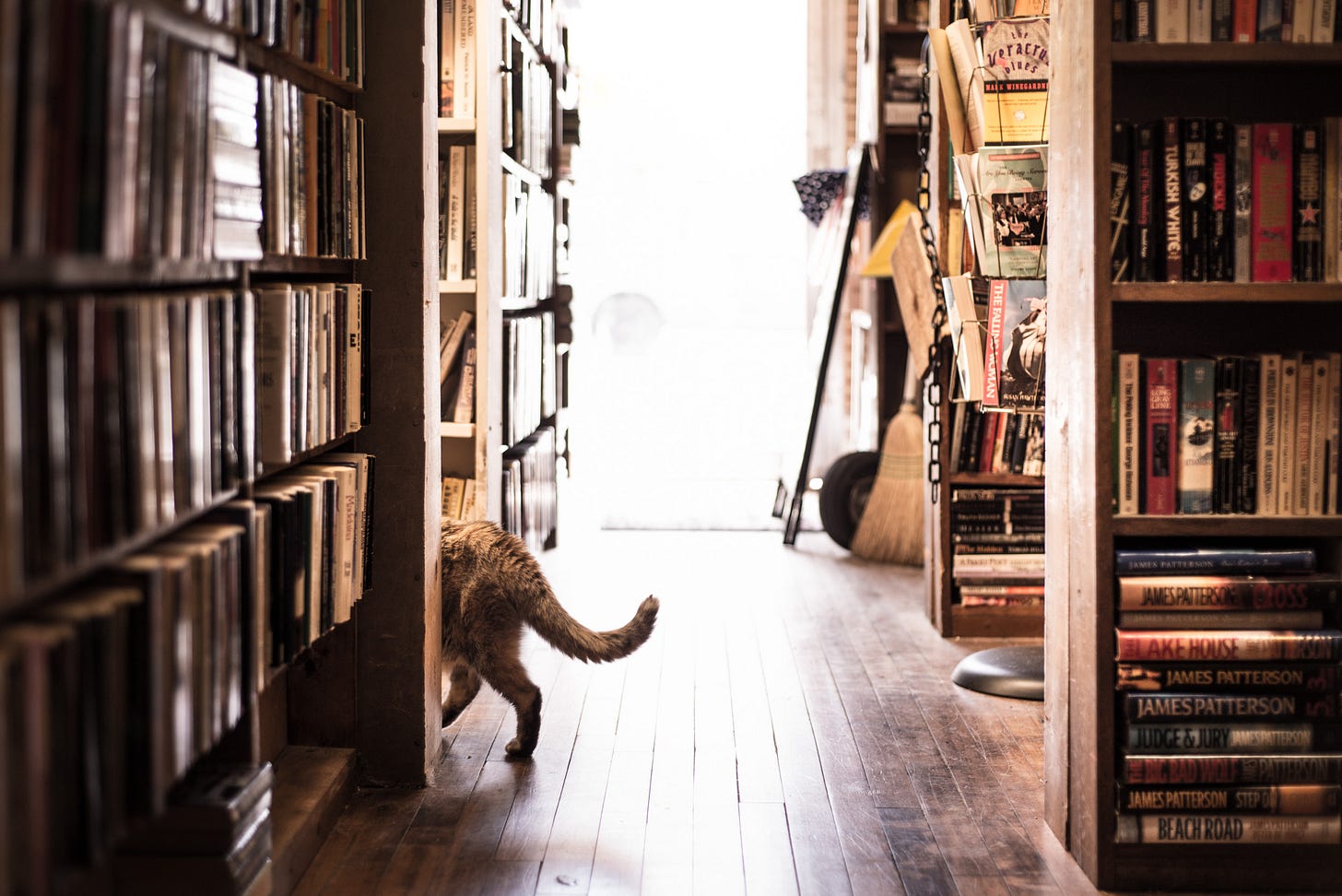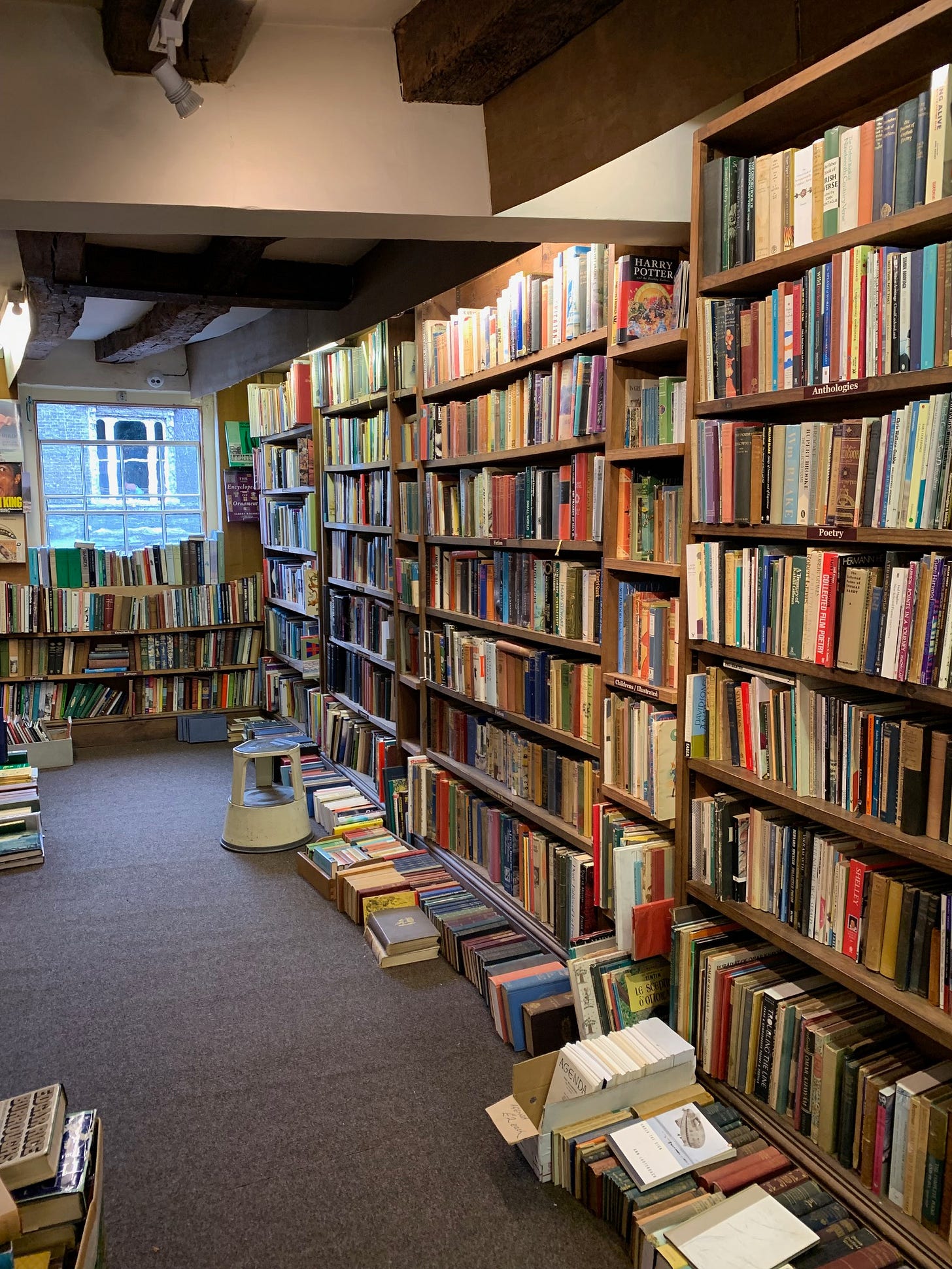There’s a certain kind of bookstore that is more than a bookstore. It’s a portal into a place beyond time and space, a great cathedral full of ancestors who have lived and loved and bled for human knowledge and the written word.
This kind of bookstore will rarely have the latest bestsellers. The best exemplars of its kind are run by scraggly-haired old men who look as though, in another life, they were cagey pirates, sinister apothecaries, or pipe-smoking wizards. The shelves are packed close together and sky-high; sometimes there are stacks of books piled in front of books, blocking aisles and threatening to bury the hapless peruser in an avalanche of musty, yellowing leaves.
A really top-notch bookshop will have a resident cat or two, sunning itself in a window, leaping haughtily out of reach when you attempt to pet her before returning to tease you twenty minutes later with a swish of silky fur against your legs.
There will be a section for antique and rare books, as well as a selection of classic reprints from The Folio Society with sewn bindings and marbled endpapers. But the real magic is in the deep cuts—like long-forgotten favorites of twenty or even forty years ago or works of history written by eccentric midcentury scholars. The shelves may appear chaotic at first, but there is almost always a ruthless efficiency of organization by subject. How this is done is always a reflection of the personal quirks and interests of the owner, though concessions are made to local tastes and trends.
My primary experience with bookshops as a child were chains encountered in my local mall. There were Waldenbooks and B.Dalton, indistinguishable from one another as far as I could tell, with their bland corporate facades and neat displays of whatever was tearing through the zeitgeist at the moment: Men Are From Mars, Women Are From Venus; The Celestine Prophecy; something by Tom Clancy or Patricia Cornwell.
There was the Zondervan Family Bookstore, the place my mother preferred to shop because she could be assured that anything she purchased for me would be free of sex, drugs, and anything “weird.” (What my mother considered weird was always a moving target, but anything that smacked too much of the occult was a safe bet. Strangely, books about fighting demons were not “weird.”)
Over the years, Zondervan grew to carry more than just books, opting to become a one stop shopping solution for all Christian gift-giving needs. Ceramic figurines depicting scenes from the Bible, scripture-wrapped Testamints that freshened your breath with the power of the Word, and, my personal favorite, an enormous crown of footlong thorns “just like the one Jesus wore” for all your Eastertide cosplaying needs.
As I grew into my teens, these gave way to the large, free-standing behemoths: Borders and Barnes & Noble, with acres of spacious bookshelves, a section for CDs complete with listening stations where you could hear the latest releases, and Starbucks-style cafés, perfect for a late-night high school hang.
I first understood what a bookstore was really for when, at the age of 18, I walked into Prospero’s Books in historic downtown Manassas, Va. It had everything—the cat, the old man, the rare books, the overloaded shelves, the higgledy-piggledy feeling of a curiosity shop in a fantasy novel. Being down the road from one of the most infamously bloody battlefields in American history, Prospero’s had a large selection on the Civil War as well as a deep shelf of inexpensive classics printed in the 60’s and 70’s. It was there I bought my first copy of T.S. Eliot’s Complete Poems as well as a few other odds and ends that were cheap enough (no more than a few bucks) for me to afford on the tips I earned waitressing.
It goes without saying that this ideal bookstore is a used bookstore; not only does it make far more sense as a business model for the determined eccentric, who will never be able to compete with the big boys on the price of new books; it is the only kind of bookstore a true book lover can lose herself in. She delights in finding a volume appended with thoughtful handwritten notes, for now she can be in communion with those who have read before her and feel a kinship with the nameless someone who has underlined the same words that she loves.
The ideal bookstore is almost always unfashionable, though there are a few outliers which have somehow managed to combine the business of being large and hip while still stocking the weird and the esoteric. The Last Bookstore in LA is an exemplar of this sort of thing. Housed in a cavernous old bank building downtown, the main floor is full of a mix of new and used books and vinyl—some of which are housed in the antique bank vaults—and cozy armchairs for reading. Upstairs, a gallery runs around the edges of the main room, filled with art—paintings and old books turned into sculpture and a crocheted spiderweb. A tunnel made of books leads to a back room filled with volumes on the more arcane and specialized subjects. It’s kind of a bookstore as postmodern art project, but it works. The owner is a relatively young man who happens to love books; I have no doubt he is well on his way to becoming a wonderfully weird old coot.
Compare this to The Strand in Manhattan, which, in my opinion—and I know some people will find this scandalous—is not in the same league. Yes, it’s a very large, very comprehensive, and well-run bookstore, and I can usually find something I like there, but there’s a bit too much self-consciousness to the whole thing. I find that NYC bookstores in general are always a bit too smug for their own good. There’s an air of, “Look at us, aren’t we smart? We have all the right ideas and opinions; there’s nobody like us in the world.” Ditto for Powell’s in Portland. Don’t get me wrong, I continue to visit these places, and I’m glad they exist, but they lack a certain pleasurable frisson, a current of sorcerous power.
The best bookstores will take you through the looking-glass and into the magical otherworld. I fancy myself something of a book witch. I have an ability to stumble upon just the book that will speak to whatever I am pondering at the moment, and others have told me that I have a gift for recommending the ideal book for their current needs. From the medieval lanes of Norwich to the gleaming streets of Palo Alto, I have more than once been pulled, as if caught on a hooked line, into a bookstore, certain that buried in the stacks is some gem wanting to reel me in.
It was in that upper room of The Last Bookstore that I once went in search of a particular text. I didn’t know what the name of it was, what it looked like, or who wrote it. In fact, I had nothing particular in mind. I only knew that there was a book there for me and that I thought it would be found in the Tarot section.
The pickings were slim, and I couldn’t see that any of them were worth buying, but the whisper in my ear was strong. There’s something here, it said. Keep searching. The clerk stocking the shelves asked me if there was anything I was looking for. I told him I wanted something on the Tarot, and he admitted they didn’t have much of a selection but proceeded to ask me about my interest, which led us into a conversation about mysticism and various esoteric philosophies.
“Okay,” he finally said after some time. “I have a book I stashed away because I didn’t want it to go to just anybody. But I can tell you’re the kind of person who will appreciate it.” He disappeared behind the shelves and returned with a copy of Meditations on the Tarot. I was absolutely delighted.
Sadly, these places don’t last forever. Prospero’s didn’t survive the pandemic, and another LA favorite, Sam Johnson’s Bookshop in Mar Vista, which I first discovered in 2013 while biking down Venice Boulevard to the beach, closed in 2019. They had a wonderful selection on religion and philosophy, including a fair amount on Christian mysticism. I found a pristine three-volume set, printed in the 80’s, of Meister Eckhart’s complete Sermons and Treatises. I paid about $30 at the time; if I were to buy it online today, it would cost that much for just one of the volumes. I am happy to say that Dove & Hudson in Albany, NY, with its excellent collection of books on medieval history, is still around, and Green Apple Books in San Francisco, despite some difficulties, remains.
I realize that it is horribly sexist of me to suggest that only old men (or men old before their time) can create these kinds of bookstores, but it seems to be the general trend. It’s not that a woman can’t create a good bookshop. One of the best occult bookstores in the world is Treadwell’s in London, with a female proprietor. They have an excellently curated selection of new books and wonderful author events, but the feel of the place is a bit too prim and neat to qualify as truly magical.
The problem with most women is that we can’t stand to present things to the public unless they are neat and tidy. My own bookshelves are overflowing with all sorts of odds and ends, but if I had my own store, I’d be hard-pressed not to make it look pretty. The thing about old men is that they don’t care about that sort of thing. They will allow a shop to become gloriously shambolic in the same way they allow their bellies to spill out over their waistbands and their socks to fall down around their ankles. It’s in the dusty, forgotten corners with precariously stacked books that the fairy-dust accumulates.
But if anyone knows some fabulous old witch who’s not afraid to run a slightly seedy bookshop, I’m happy to be proven wrong.
In addition to writing, I offer psychic aura readings. My clients tell me that these readings are “life-changing,” “very accurate,” and can help them make big decisions or changes in their lives. To find out more about those, along with my other services, check out rebekahberndt.com or book a reading below:








Bookman's Corner in Chicago was precisely this. RIP John Chandler, the owner. He died with his boots on.
Wow! Lovely post.
If I had any money, I’d love to make a whole Substack devoted to finding the most unique, unusual, and beautiful bookstores in the country, road-tripping across America to all the little forgotten places, hoping to find treasures like you’ve described here… wonderful! 👏 👏 👏